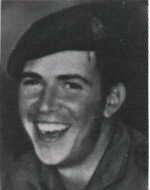Son of-David-Zvi and Esther. He was born on May 3, 1951, in Tel Aviv. He began his studies at the Yeshurun elementary school. In the lower grades, he was a quiet, self-contained boy who did not stand out very well, but from the fifth grade on he began to stand out in his diligence and diligence and to trust the outstanding students. He always used to show his good grades in modesty, as if in passing. The director of the Yeshurun school wrote in his memory after his fall: “Aryeh absorbed Torah and was insatiable, and he always loved to learn and to add knowledge.” He was naive, courteous and gentle, a good friend of his friends and always loved to teach them good. His personal charm was to acquire the Lev of others and to be loved by all, and his nobility was manifested in the culture of speech, his mannerisms, his politeness and his relations with his friends – he always faithfully fulfilled every task he was given and could not refuse, But for its own sake. ” He was a member of the Bnei Akiva youth movement and traveled extensively with his friends in Israel. Every day he took advantage of trips on the paths of the country and his many photographs commemorated his trips and tours. He was diligent and punctual in his studies, yet he always found time to play flute and horn. He is also a member of the Holon Municipal Orchestra. In addition, he liked to work in handicrafts, and his hobbies were to boast carpenters, miniature aircraft, stamp collecting, postcards, and spectacular natural photography, slideshows and more; It was a wide range of activities. At the beginning of his studies at the “Nehalim” High School, he could no longer continue with regular music lessons, yet he took every opportunity to play and not forget what he had learned during six years of musical education. It was a holiday for the family when he began studying at the “Nehalim” High School. Although emotionally it was not easy for parents to get used to his absence for many days, their hearts were Simcha at parent meetings when they met with his teachers. Aryeh-Mordechai quickly adapted himself to living in a boarding school, and after a few weeks he felt like a “veteran resident”. He studied at the yeshiva for four years and won the prestige of his friends and teachers. The head of Yeshivat Nehalim wrote about him after his fall: “The man of the clusters – a man of everything.” The Rosh Yeshivah detailed all his virtues and spiritual qualities, and noted that during his service in the IDF, his lifestyle was a model for all, and the yeshiva students were surprised to hear from soldiers who were not observant of Torah and mitzvot. “When Arik is at the post, an atmosphere of holiness prevails in him.” And just as he sanctified the name of God in his death, so in his lifetime he fulfilled the Chazal’s article (Yoma 56) “And you shall love the Lord your God that the name of God falls in love with Your hand. “When he finished his studies in Yeshivah, he deliberated a lot and consulted with the parents, but it seems that in his Lev a decision was made to fulfill a lofty and sacred task for which he would not speak openly. And know the parents who wrote to the secretary of Kibbutz Ein Hanatziv: “I decided to sanctify the name of heaven.” His high school grades opened all the gates. The parents tried to convince him that the army would be of great benefit to academics, but he insisted: “If everyone is an academic, who will protect the country now?” After completing his studies at Yeshivat Nehalim, he took upon himself to study for one year at Mercaz HaRav Yeshiva, where he also succeeded in his studies, but his conscience bothered him and pushed him to enlist. He was drafted into the IDF in November 1969 and chose to serve in the combat forces of the paratroopers, and even planned to be a parachuting instructor, knowing that he was causing distress to the parents, but he was determined.Was to be an officer in the paratroopers. With great satisfaction, he noted his religious influence on the members of the kibbutzim in his company: “We add to them a religious atmosphere and thank God that they accept it willingly and with understanding, and willingly join the minyan in prayer, listen to kiddush and on Shabbat nights, “He said. Immediately after Passover, he was about to descend to the front of the canal, but he did not reveal it to the parents even with a slight hint. On May 19, 1970, about seven months after his enlistment, he fell in the Suez Canal region during the shelling of the enemy. He was laid to rest in the military cemetery in Kiryat Shaul. After his fall, a book entitled “In Memory of Arik” was published, which opens with an article by Israel’s Chief Rabbi, Rabbi Isser Yehudah Unterman: “But a single man is a dear yeshiva student who fell” – his biography, letters and photographs.
